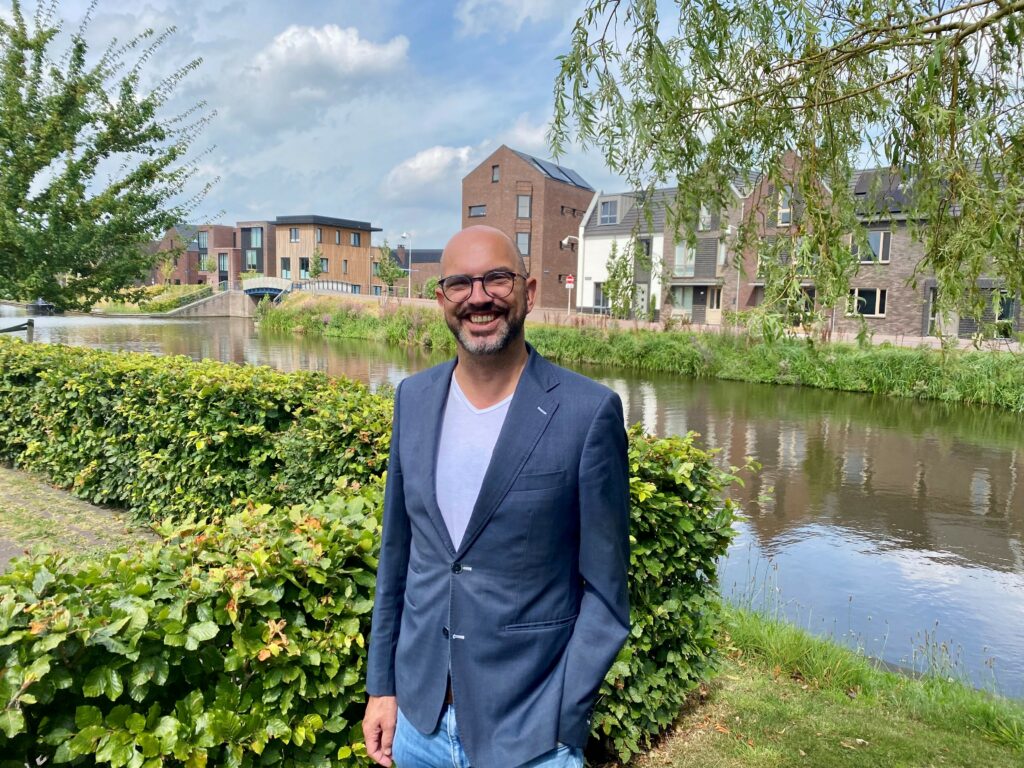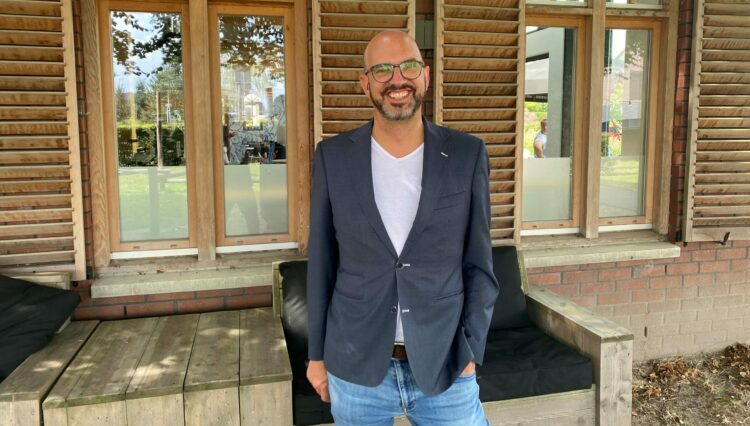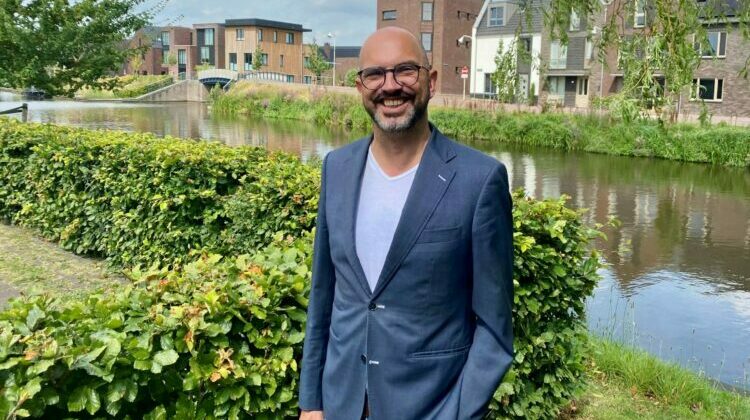
The changing of the guard at the ANVR could not have gone more smoothly.
After seventeen years as director, Frank Oostdam handed over the baton to his namesake, Frank Radstake, this summer.
With fourteen years of service under his belt, Radstake knows better than anyone what is going on with the members and with the ANVR.
‘I sincerely believe that as a sector we can have a positive impact on the world.’
You have been working in your new position as ANVR director for a few weeks now.
How do you like it so far? ‘It’s only been a short time, so not much has changed yet, and that’s nice for me. I didn’t suddenly start working or thinking very differently. Most people in the industry have known me for fourteen years, so they know what I’m like and what to expect. What is new, however, is that I am now also a director of the ANVR. In my previous position, I mainly prepared the decision-making process, but now I am also ultimately responsible for the decisions that are made. In addition, I am now the point of contact for everything that has to do with the secretariat of the ANVR. And in the end, I am looked to for final decisions. Incidentally, it is especially nice that we have a really great team at the ANVR with whom it is very good to work: both the colleagues and the board.’ What does that mean in practice? ‘That means that I now have a broader responsibility. Where I used to be mainly involved in preparing decisions, I am now also the one who has to make the decisions. That brings a different dynamic, also because I am now more aware of the impact of every decision I make. In addition, more external visibility has also been added. As a director and director, I am often asked to represent the ANVR, both within the sector and beyond. This brings with it extra responsibility, but I see it mainly as an opportunity to convey our vision and strategy even better.’ How do you differ from the previous Frank? ‘I wonder if that question would have been asked so often if we hadn’t both been called Frank. Anyway, the main difference is, and as a Rotterdammer you will agree, he really had a dramatic taste in football as an Ajax fan. I am a fanatic PSV player. But what has made our collaboration so pleasant over the past few years is that Frank and I think the same about a lot of things. In terms of social vision and politics, but also in terms of work. So a lot of times we had similar ideas about how to tackle problems; what the desired lobbying approach would be, what the lobbying technique would be. And perhaps also the same idea as to what the role of the trade association is. And other than that, he and I are just a completely different person, I think.’ How do you prepare for the increased visibility that this feature brings? ‘As far as the media is concerned, I think I’m well prepared. In the past, I have gained a lot of experience with press contacts, both during my work at the pension fund and within the ANVR. I also did media training at the time, so I’m not looking forward to that with nerves. What is different is that I am now in a position where I am not only asked as an expert, but can also be questioned more critically. But I am confident that, with the support of my colleagues and the board, this will go well. Of course, there will be times when you think: ‘I should have said that differently’, but that’s part of it. Even my predecessor still had that after seventeen years. So it’s also important to give myself the space to grow in this new role.’
We don’t want sustainability to be an afterthought, but an integral part of the travel industry.”
‘What is also different is that I am now more often the face of the organisation, not only for positive messages, but also for more complex and sometimes critical issues. I am aware that this is part of the responsibility that comes with this role. What is most important to me is that I stay true to myself and to the values that I find important, even when the pressure is high.’ What are the key policy areas you will be focusing on in this new role? ‘In the coming period, I will mainly focus on a number of core areas. Firstly, everything that has to do with sustainability, which is a spearhead within our vision of a future-proof travel industry. Last year in Oviedo (Spain) we presented our ambitious goals for 2050. Over the past six months, we’ve been working on a roadmap to achieve those goals. We have worked intensively with some 65 companies to develop this vision, and we have a lot to deal with in that area. These include climate, sustainable supply chains, and the positive impact of tourism on destinations. These are broad themes, each with its own challenges and opportunities.’ ‘In terms of sustainability, we focus on three main themes: climate, sustainable supply chains, and the positive impact of tourism on destinations. In terms of climate, we want to significantly reduce emissions from the travel industry. We do this by promoting alternatives such as short-distance trains and by focusing on renewable energy sources within the sector. We don’t want sustainability to be an afterthought, but an integral part of the travel industry. This requires a long-term vision and cooperation at all levels, from small entrepreneurs to large players in the sector.’ ‘We are also focusing on supply chains. We want these chains to be not only efficient, but also sustainable and ethical. This means that we pay attention to the working conditions of the people who are part of these chains, as well as the ecological impact of their work. We want to create a sector in which every link in the chain contributes to a better world, both socially and ecologically. This requires close collaboration with our partners and suppliers to ensure that our sustainability ambitions are actually realised.” ‘The third theme is the positive impact of tourism on destinations. Tourism can be a powerful tool for economic development and cultural exchange, but it can also have negative consequences if not properly managed. We want to ensure that tourism makes a positive contribution to local communities, for example by investing in sustainable infrastructure and by carefully monitoring the impact on local culture and nature. This is a complex area, but I believe that with the right approach, we can make a big positive change.” Another theme you mentioned is the balance between consumer protection and practicability.
Can you explain that? “Consumer protection remains at the heart of what we do. The revision of the European Package Travel Directive and the Passenger Rights Regulations poses challenges, especially when it comes to finding the right balance between protection and workability. We want to prevent regulations from becoming so strict that it becomes unattractive for travel providers to offer package holidays. At the same time, we must ensure that consumers remain well protected. It is a question of preserving the added value of package holidays without making it too complex or costly for providers. We are working closely with both national and European policymakers to ensure that the new rules benefit both the industry and consumers.”  ‘We have to make sure that the regulations don’t go too far and unintentionally harm the sector. This requires a nuanced approach, in which we not only look at what is legally feasible, but also at what is practically feasible for the companies that have to comply with these rules. It is important that the legislation remains in line with the reality of the market, so that we can continue to protect consumers on the one hand, but also guarantee the vitality of the sector on the other. We have already had success with this in the past. I am determined to continue in that vein.” You spoke earlier about the modernization of the ANVR.
‘We have to make sure that the regulations don’t go too far and unintentionally harm the sector. This requires a nuanced approach, in which we not only look at what is legally feasible, but also at what is practically feasible for the companies that have to comply with these rules. It is important that the legislation remains in line with the reality of the market, so that we can continue to protect consumers on the one hand, but also guarantee the vitality of the sector on the other. We have already had success with this in the past. I am determined to continue in that vein.” You spoke earlier about the modernization of the ANVR.
What are your plans? ‘The modernisation of the ANVR is essential to remain relevant in a rapidly changing sector. One of our goals is not only to be dependent on membership fee income, but also to tap into new sources of income, for example by offering additional services. We must continue to expand and improve our services in order to provide the best possible support to our members. In addition, we want to encourage more cooperation and networking within the sector, something that is already being done successfully in other countries, such as Germany.’ ‘Another aspect of modernisation is maintaining and increasing diversity and inclusivity within the sector and our organisation. This is a challenge, but I believe it is essential for the future of the ANVR and the travel industry as a whole. We want to ensure that the sector remains attractive to a wide range of talents and that everyone feels welcome to contribute to this dynamic industry. This means that we should not only look at the existing way we work, but also be open to new ideas and perspectives.’
‘As far as I’m concerned, the door is open for Booking.com to become a Member’
‘In addition, we also want to modernise the ANVR itself in the way we serve our members. This means that we need to update our processes and systems in order to work more efficiently and effectively. We want to provide more value to our members by giving them access to the latest information and tools that can help them succeed in an ever-changing market. This requires an investment in technology and innovation.’ When do you expect to bring Booking.com in as an ANVR member? Radstake (laughs): ‘As far as I’m concerned, the door is open for Booking.com to become a member. The company is a major player in the tourism ecosystem and fulfills a role in customers’ travel needs. As ANVR, we have the ambition to be as broad a trade association as possible, and as far as I’m concerned, that includes parties such as Booking.com and Airbnb, provided they fit within our quality mark. It would be nice if we could welcome them, but that also depends on their willingness to commit to the travel industry. We definitely see opportunities, but it also has to fit in well with what we want to achieve as an association.’ “We want to make sure that all members hold themselves to the same high standards. This is important for maintaining the confidence that consumers have in our quality mark. But I believe that, given its position in the market, Booking.com could contribute a lot to the ANVR and the broader travel industry. We’ll see how the conversations develop.’ What are your long-term ambitions, both for yourself and for the ANVR? ‘The ambition is to continue to develop the ANVR as a strong and broad trade association that is relevant to all players in the travel industry. I want to make sure that we are an association where our members feel at home and where they get the support they need. In addition, I want the ANVR to continue to play a pioneering role in sustainability and responsibility within the sector. We have set out a vision for 2050. My goal is to make sure we take the steps necessary to make that vision a reality. Personally, I hope that I can contribute to a more sustainable and inclusive travel industry, in which the ANVR plays a central role.’ ‘For myself, I see it as a personal mission to ensure that the ANVR remains a leading voice in the discussions about sustainability and responsibility in the travel industry. That’s what I’m really passionate about, and I believe that as an industry we can have a positive impact on the world.”
Briefly…
What was your first job? ‘My first job, if we’re talking about a real ‘big people job’, was at a wholesaler in Groningen. There I worked as a department manager and later at the head office in Diemen, where I was involved in HR, terms of employment and internal communication. I learned a lot about business operations and management there. That experience prepared me well for my later roles. It was also the place where I discovered that I have a passion for working with people and improving processes, something that drives me to this day.’ What would you do if you didn’t work at the ANVR? ‘That’s a difficult question, because I’m very happy with what I’m doing now. But if I had to choose something else, I think I would like to work within another association. I really fell in love with working within the world of associations. The dynamic, being able to contribute to something bigger than yourself, appeals to me enormously. Maybe I’d even look at an international role, given my interest in global collaboration and impact. Working in an association offers the opportunity to make a real difference, and that is something that has always appealed to me.’ What’s the best piece of advice you’ve ever received and from whom? ‘The best advice I ever received was to always look at your own work from the perspective of the person you work for.
I got this advice from a coach when I was active in Groningen.
He said that not only does your work get better when you look at it through the eyes of your client, but you also gain more appreciation for your own work.
This is an approach I try to apply on a daily basis, especially in my role at the ANVR, where it is essential to put the needs and expectations of our members first.
It helps me to stay focused on what’s really important to the people and companies we serve.’
